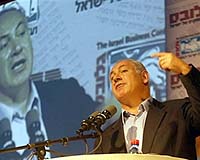| . |  |
. |
Washington (AFP) Sept 2, 2010 Israeli and Palestinian leaders launched their first direct negotiations in 20 months here Thursday, agreeing to meet every two weeks in a bid to reach a lasting peace settlement within a year. "Thank you for your courage and commitment," US Secretary of State Hillary Clinton told Israeli Prime Minister Benjamin Netanyahu and Palestinian president Mahmud Abbas as she opened what turned into four hours of talks. "I know the decision to sit at this table was not easy," the chief US diplomat said at a rectangular table in a chandeliered room at the State Department, referring to the "suspicion and skepticism" surrounding the talks. After a day of weighty symbolism and lofty rhetoric at preparatory meetings with President Barack Obama at the White House, Netanyahu and Abbas began sharpening their points and presenting opening demands. "We expect you to be prepared to recognize Israel as the nation state of the Jewish people," Netanyahu told Abbas, as the two sat on either side of Clinton with their national flags behind them. The Palestinians fear recognition of the Jewish state would undermine the right-of-return claims of Palestinian refugees who left or fled Israel when it was created in 1948, In the wake of two Palestinian militant attacks on settlers in occupied West Bank, Netanyahu also renewed references he made at the White House on Wednesday to protecting Israel's security. "A real peace must take into account the genuine security needs of Israel," Netanyahu said. Abbas appeared conciliatory on the security front, saying: "We consider security as essential and vital both for us and for you, and we will not accept that anyone commits any act that would harm your security or ours." The Palestinian leader said investigations into the shootings that killed four Israeli settlers on Tuesday were progressing. But he also stuck to his demands on settlements. "We call on the Israeli government to move forward with its commitment to end all settlement activity and completely lift the embargo over the Gaza Strip," Abbas said. Israel tightly controls access and egress from the Gaza Strip, which is run by the militant Hamas group, a rival of Abbas's Palestinian Authority and a fierce opponent of the peace talks. The two Middle East leaders poignantly shook hands, and then Abbas appeared to give Netanyahu a thumbs up. The leaders then went behind closed doors to begin tackling the core issues that have bedeviled past peace attempts -- Israel's security, borders of a Palestinian state, the right of return for Palestinian refugees and the fate of Jerusalem. US Middle East envoy George Mitchell described a first 90-minute meeting between him Clinton, Abbas and Netanyahu as "productive." Netanyahu and Abbas then held a one-on-one meeting which officials said later lasted 93 minutes. The Palestinians said Abbas had reiterated face-to-face with Netanyahu his demand that settlement construction must cease for the talks to continue. A final three-party meeting lasted 18 minutes. There were no notetakers or translators in any of the meetings. The Israeli and Palestinian leaders agreed to resume their talks on September 14-15 in the Middle East, planning to meet every two weeks thereafter, said Mitchell who intended to be present with Clinton. A Palestinian official said the talks would take place in Sharm el-Sheikh, Egypt. Mitchell said the two leaders agreed that a logical next step would be to start working on a "framework agreement" that would lead to "a comprehensive treaty that will end the conflict and establish a lasting peace." Mitchell, a former troubleshooter in Northern Ireland who has a reputation as a dogged mediator, has said he is prepared to intervene with "bridging proposals." Abbas had previously refused to enter direct negotiations without a full halt to Israeli settlement activity, but yielded under pressure from Obama. The Palestinian leader is still warning that a renewal of settlement activities after September 26, when a 10-month partial moratorium expires, would end the negotiations. The settlements house about 500,000 people on lands occupied by Israel in 1967. The last direct peace negotiations ended in December 2008 when Israeli forces invaded Gaza to halt Hamas rocket fire on Israel.
Share This Article With Planet Earth
Related Links
 Netanyahu sparks 'cautious hope' at peace talks
Netanyahu sparks 'cautious hope' at peace talksWashington (AFP) Sept 1, 2010 Israeli Prime Minister Benjamin Netanyahu vowed to forge a "historic" peace with the Palestinians Wednesday, injecting cautious hope into US President Barack Obama's long-odds Middle East talks. Palestinian president Mahmud Abbas met hawkish Netanyahu's conciliatory rhetoric by calling for an end to bloodshed after the latest Hamas attack in the West Bank, but also demanded a halt to Israel ... read more |
|
| The content herein, unless otherwise known to be public domain, are Copyright 1995-2010 - SpaceDaily. AFP and UPI Wire Stories are copyright Agence France-Presse and United Press International. ESA Portal Reports are copyright European Space Agency. All NASA sourced material is public domain. Additional copyrights may apply in whole or part to other bona fide parties. Advertising does not imply endorsement,agreement or approval of any opinions, statements or information provided by SpaceDaily on any Web page published or hosted by SpaceDaily. Privacy Statement |